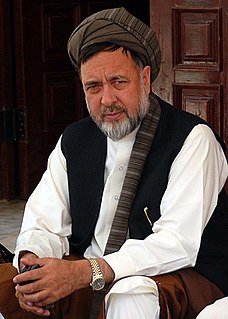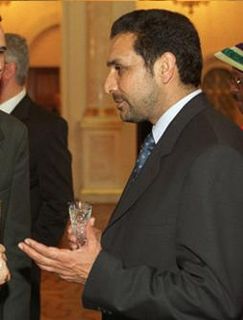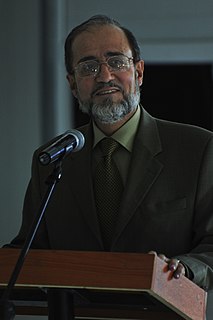Related Research Articles

Sardar Mohammed Daoud Khan, also romanized as Daud Khan or Dawood Khan was an Afghan statesman who served as the 5th Prime Minister of Afghanistan from 1953 to 1963 and as President of Afghanistan from 1973 to 1978. Born into the Musahiban royal family, Khan started as a provincial governor in the 1930s and later a commander before he was chosen as prime minister in the monarchy of his first cousin, Mohammed Zahir Shah. Ten years after his resignation as prime minister, Khan overthrew the monarchy with the backing of Afghan Army officers and declared himself as the first President of the Afghan republic in 1973, renouncing his royal title.

The People's Democratic Party of Afghanistan was a Marxist–Leninist political party in Afghanistan established on 1 January 1965. Four members of the party won seats in that year's parliamentary elections, reduced to two seats in 1969, albeit both before parties were fully legal.

Haji Muhammad Mohaqiq, born 26 July 1955 in Balkh, is a current politician in Afghanistan, serving as a member of the Afghanistan Parliament. He is also the founder and chairman of the People's Islamic Unity Party of Afghanistan. During the 1980s, he served with the mujahideen rebel forces fighting against the Soviet-backed Afghan government. After the withdrawal of the Soviet Union in 1989, Mohaqiq was appointed as the leader of the Hezb-e Wahdat for northern Afghanistan.

General Abdul Rahim Wardak, an ethnic Pashtun, is an Afghan politician and former Defense Minister of Afghanistan. He was appointed on December 23, 2004 by Afghan President Hamid Karzai. Before this appointment, Wardak was the deputy Defense Minister to the former minister, Mohammed Fahim. During the 1980s Soviet–Afghan War, Wardak had been a national Mujahideen resistance leader who fought the Soviet forces. He is an ethnic Pashtun from the Wardak province. His diplomacy has been instrumental in promoting ethnic reconciliation due to his lineage from tribal chieftains with strong Pashtun relationships with all ethnic groups of the country. He is fluent in Pashto, Dari (Persian), and English.

Ahmad Zia Massoud was the Vice President of Afghanistan in the first elected administration of President Hamid Karzai, from December 2004 to November 2009. He is a younger brother of the late Ahmad Shah Massoud, the resistance leader against the Soviet invasion of Afghanistan and against the Taliban. In late 2011, Ahmad Zia Massoud joined hands with major leaders in the National Front of Afghanistan, which strongly opposes a return of the Taliban to power. The National Front is generally regarded as a reformation of the United Front which with U.S. air support removed the Taliban from power in late 2001.
Ahmad Shah Ahmadzai is an Afghan politician. He served as the prime minister of Afghanistan from 1995 to 1996. He is an ethnic Pashtun from the Ahmadzai sub-tribe.

National Islamic Front of Afghanistan is a political party in Afghanistan. It has been led, since its founding, by members of a prominent Sufi family, the Gailani. It is primarily a Pashtun party, followers of the Sufi holy man Pir Sayed Ahmed Gailani have a reputation for moderate thought and the traditional mystical and introspective religious currents that characterize Sufism in that sect.

Abdul Latīf Pedrām is a politician and a Member of Parliament in Afghanistan. He emerged as a controversial figure in the press and political circles for campaigning for women's personal rights, a taboo subject in Afghanistan's culture. Currently, he is the leader of the National Congress Party of Afghanistan and is one of the nine representatives of Badakhshan province in the lower house of parliament.
Movements for Muslim women to seek roles in national leadership have increased rapidly. Greater opportunities for women in education have further encouraged their involvement in politics. The most prominent Muslim female leaders are former prime minister of Pakistan Benazir Bhutto, Indonesian President Megawati Sukarnoputri, former Turkish Prime Minister Tansu Ciller, former Senegalese Prime Minister Mame Madior Boye, Bangladeshi Prime Ministers Khaleda Zia and Sheikh Hasina Wajed, former Iranian Vice President Masoumeh Ebtekar, former Malian Prime Minister Cissé Mariam Kaïdama Sidibé, Kosovan President Atifete Jahjaga, former President of Mauritius Ameenah Gurib, and current President of Singapore Halimah Yacob.
Mirwais Yasini میرویس یاسینی is the current First Deputy Speaker of the Lower House of the Afghan Parliament. Following the Communist coup in 1978, Mirwais Yasini worked actively to combat the Soviet invasion, and went on to oppose the Taliban from 1993 to 2001 as a social and political activist. After the fall of the Taliban regime in 2002, Yasini began his political career as the Director of Foreign Relations and Economic Evaluation for Afghanistan's Ministry of Finance, and as a prominent member of the Emergency Loya Jirga, which met in Kabul. Since that time he has held several high-level political posts, including such titles as the First Deputy Speaker of the Constitutional Loya Jirga and Director General of the Counter Narcotics Department.

Abdullah Abdullah is an Afghan politician who leads the High Council for National Reconciliation (HCNR), which is expected to lead the intra-Afghan peace talks with the Taliban. He served as Chief Executive Officer of the Unity Government of the Islamic Republic of Afghanistan from September 2014 until March 2020. From October 2001 to April 2005, he served as Minister of Foreign Affairs. Prior to that he was a senior member of the Northern Alliance working as an adviser to Ahmad Shah Massoud. He also worked as a medical doctor during the late 1990s.

The Afghanistan conflict is a series of wars that has been fought in Afghanistan since 1978. Starting with the Saur Revolution military coup, an almost continuous series of armed conflicts has dominated and afflicted Afghanistan. The wars include:
Al Hajj Abdul Ghafoor Zori is a citizen of Afghanistan who was a candidate in Afghanistan's 2009 Presidential elections.
Al Hajj Shah Mahmood Popal is a citizen of Afghanistan who was a candidate in Afghanistan's 2009 Presidential elections. Popal is a politician and a former commander during the Soviet occupation of Afghanistan.
Mahbob-U-lah Koshani is a citizen of Afghanistan who was a candidate in Afghanistan's 2009 Presidential elections.
Habib Mangal is an Afghan citizen who was a candidate in Afghanistan's 2009 Presidential elections.
Said Jalal Karim is a citizen of Afghanistan who was a candidate in Afghanistan's 2009 Presidential elections.
Motasim Billah Mazhabi is a citizen of Afghanistan who was a candidate in Afghanistan's 2009 Presidential elections.

Dr. Zabihullah Mojaddidy is an Afghan politician. He served as the Governor of Kabul Province between July 2009 and until resigning in March 2011. His resignation was due to a lack of support from development ministries and the Presidential Palace in regard to his ideas for the reconstruction of Kabul City. Prior to becoming governor, he served as the Deputy Minister of Higher Education.
References
- 1 2 3 4 5 6 "Contender Biographies - Zabihullah Ghazi Nuristani's Biography". Pajhwok Afghan News. Archived from the original on 2011-07-06. Retrieved 2010-06-09.
- ↑ "Preliminary Result of Afghanistan Presidential Contest". Sabawoon online. 2009-08-20. Archived from the original on 2009-08-03.